|
The following article is excerpted from "Bringing Active
Learning to the Biochemistry Classroom One Step at a
Time" by Dr. Jenny Loertscher, co-author of
Foundations of Biochemistry,
published by Pacific Crest. Dr. Loertscher's article
appeared in the December issue of
ASBMB today, the monthly publication by the
American
Society for Biochemistry and Molecular Biology.
In one of his recent President’s
Messages (“A Teachable Moment,” October 2009),
Gregory A. Petsko reflected on the potential of the
American Society for Biochemistry and Molecular
Biology to lead the way in revitalizing biochemistry
and molecular biology education. In response to
findings and directives from the Teagle working
group (1), Petsko suggested that the time is right
for our community to broaden educational goals
within the BMB major. This is also a current
priority for the National Science Foundation and the
National Academy of Sciences (2). In addition to
increasing student engagement in the classroom,
teaching strategies that promote active learning
help students improve skills such as writing,
speaking, critical thinking, problem solving and
teamwork. Although our colleagues in the humanities
and social sciences bear some responsibility for
helping our students to learn these skills,
ultimately, if we expect future biochemists and
molecular biologists to have these competencies, we
need to step up our teaching efforts in those areas.
College and university science
teachers long have considered the laboratory the
most appropriate arena in which to help students
develop the thinking, communication and social
skills necessary to succeed in scientific and
medical professions. Focusing on scientific skills
during lab is effective, but, as we try to elevate
performance so that students can compete on a global
level, teaching skills in the classroom is
essential. Fortunately, a number of resources
already exist for those who are interested in doing
this.
POGIL
Process-oriented guided
inquiry learning (POGIL) is one approach that aims
to help students build an understanding of
scientific concepts while simultaneously developing
skills such as oral and written communication,
problem solving, critical thinking and teamwork
(3). . . .
We invite you to read the
full article at:
http://www.asbmb.org/asbmbtoday/asbmbtoday_article.aspx?id=4758
|


